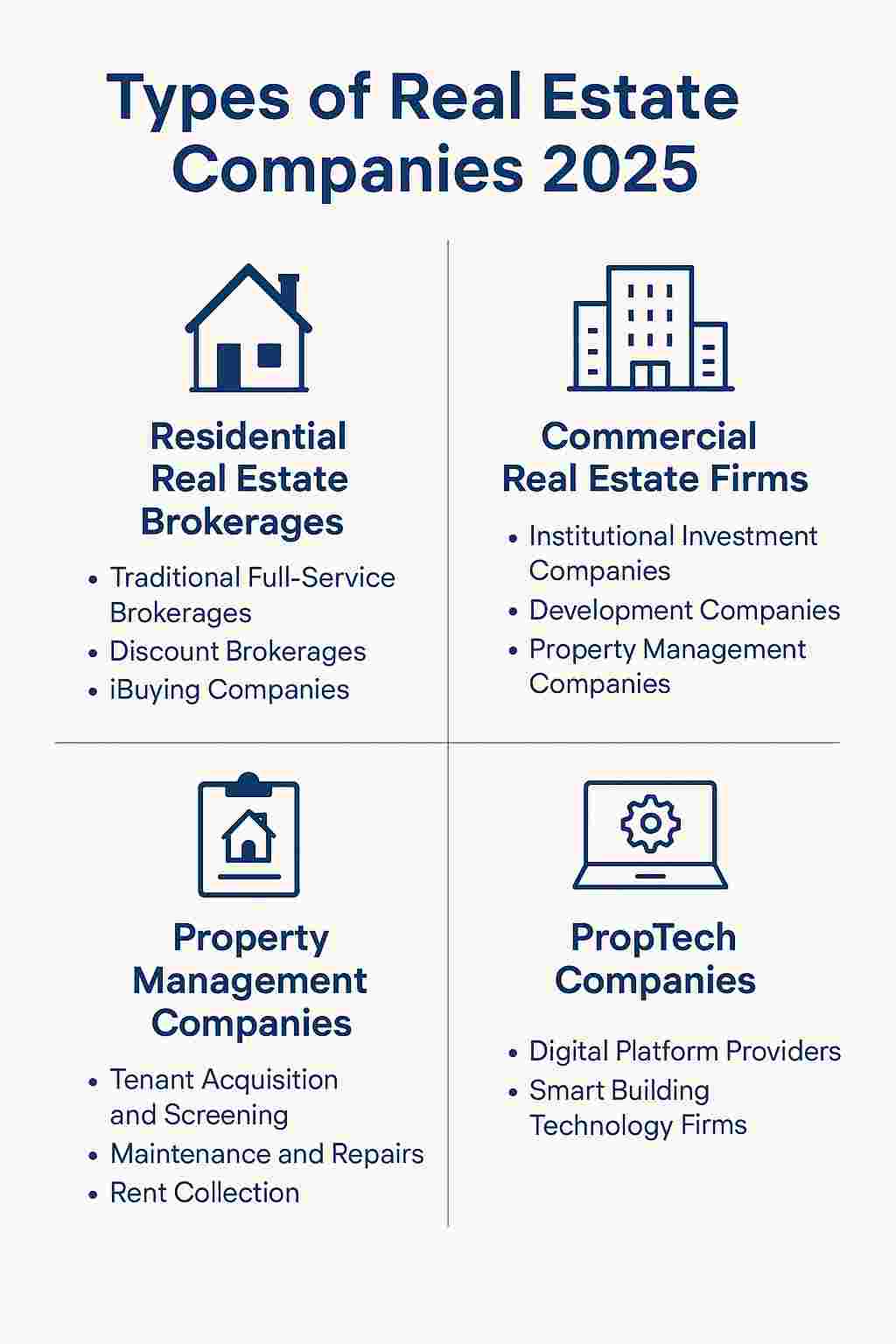Last Updated on July 26, 2025 by Admin
The real estate industry continues to evolve rapidly in 2025, with companies adapting to new market conditions, technological advances, and changing consumer expectations. Whether you’re considering a career in real estate, looking to buy or sell property, or exploring investment opportunities, understanding how real estate companies operate is crucial for making informed decisions.
ConstructionCareerHub App is LIVE — built ONLY for construction careers. Don’t apply with a weak resume.
Get ATS-ready Resume Lab + Interview Copilot + Campus Placement Prep (resume screening, skill gaps, interview readiness) — in minutes & Other advanced features.
Explore Smarter Construction Career Tools →Quick check. Big impact. Start now.
Key Takeaway: Real estate companies serve as intermediaries and service providers in property transactions, utilizing diverse business models from traditional brokerage to cutting-edge PropTech solutions to generate revenue through commissions, fees, and value-added services.
Table of Contents
What Are Real Estate Companies?
Real estate companies are businesses that facilitate, manage, and profit from property transactions and services. These organizations operate across residential, commercial, industrial, and specialized property sectors, providing essential services that connect buyers with sellers, tenants with landlords, and investors with opportunities.
Core Functions of Real Estate Companies
Property Transaction Services:
- Buying and selling facilitation
- Market analysis and property valuation
- Contract negotiation and management
- Due diligence and compliance oversight
Property Management Services:
- Tenant acquisition and screening
- Maintenance and repairs coordination
- Rent collection and financial management
- Lease administration
Investment and Development:
- Property acquisition for investment portfolios
- Development project management
- Real estate investment trust (REIT) operations
- Market research and feasibility studies
How Real Estate Companies Generate Revenue in 2025
The revenue models for real estate companies have evolved significantly, especially with the integration of PropTech solutions and digital transformation initiatives.
Traditional Revenue Streams
Commission-Based Income: Most real estate companies earn through commissions, typically 5-6% of the property sale price, split between buyer and seller agents. Despite market challenges in 2025, commission structures remain the primary revenue source for traditional brokerages.
Property Management Fees: Companies charge 8-12% of monthly rental income for comprehensive property management services, including tenant relations, maintenance coordination, and financial reporting.
Transaction Fees: Fixed fees for specific services, such as:
- Document preparation and processing
- Closing coordination
- Title and escrow services
- Market analysis reports
Emerging Revenue Models
Technology Service Fees: PropTech companies are introducing subscription-based models for digital tools, including:
- AI-powered market analytics platforms
- Virtual tour and 3D modeling services
- Smart building management systems
- Blockchain-based transaction platforms
Data Monetization: Companies leverage property and market data to create additional revenue streams through:
- Market intelligence reports
- Predictive analytics services
- Lead generation platforms
- Comparative market analysis tools
Types of Real Estate Companies and Their Business Models

Residential Real Estate Brokerages
Traditional Full-Service Brokerages: Companies like RE/MAX, Coldwell Banker, and Keller Williams provide comprehensive services including marketing, negotiation, and transaction management. They maintain extensive agent networks and focus on relationship-based business development.
Discount Brokerages: With new regulations and market pressures in 2025, discount brokerages offering reduced commission structures have gained market share by streamlining services and leveraging technology.
iBuying Companies: Technology-driven companies that purchase homes directly from sellers, renovate them, and resell them quickly. Despite market fluctuations, this model continues to evolve with improved pricing algorithms and risk management.
Commercial Real Estate Firms
Institutional Investment Companies: Large firms managing billions in commercial assets, including office buildings, retail centers, and industrial properties. These companies are adapting to post-pandemic workplace changes and focusing on data centers and logistics properties.
Development Companies: Firms specializing in ground-up construction and major renovation projects. In 2025, these companies are prioritizing sustainable building practices and smart technology integration.
Property Management Companies: Specialized firms managing commercial portfolios for institutional owners, focusing on operational efficiency and tenant satisfaction.
PropTech Companies
Digital Platform Providers: Companies developing software solutions for real estate professionals, including CRM systems, marketing tools, and transaction management platforms.
Smart Building Technology Firms: Organizations specializing in IoT integration, energy management systems, and building automation solutions that enhance operational efficiency and sustainability.
Technology’s Impact on Real Estate Companies in 2025

Artificial Intelligence and Machine Learning
AI is revolutionizing real estate operations by providing predictive analytics, automated property valuations, and enhanced customer service through chatbots. Companies are using machine learning algorithms to:
- Predict market trends and property values
- Automate lead scoring and customer matching
- Optimize pricing strategies
- Enhance property search and recommendation systems
Virtual and Augmented Reality
Virtual tours and 3D property visualizations have become standard practice, allowing companies to:
- Reduce physical showing requirements
- Expand market reach to remote buyers
- Showcase properties under construction
- Provide immersive renovation and design previews
Internet of Things (IoT) and Smart Buildings
IoT integration is enabling real estate companies to offer value-added services, including:
- Energy consumption monitoring and optimization
- Predictive maintenance systems
- Enhanced security and access control
- Real-time occupancy and space utilization analytics
Blockchain and Digital Transactions
Companies are exploring blockchain technology for:
- Secure and transparent property transactions
- Smart contract automation
- Fractional ownership platforms
- Digital identity verification
Choosing the Right Real Estate Company: 2025 Considerations
Technology Integration and Digital Capabilities
Essential Digital Services:
- Professional photography and virtual tours
- Online listing management and syndication
- Digital transaction management platforms
- Mobile-responsive customer portals
Advanced Technology Features:
- AI-powered market analytics and pricing tools
- Drone photography and video services
- 3D virtual staging and visualization
- Smart home integration consultation
Market Expertise and Specialization
Local Market Knowledge: Choose companies with demonstrated expertise in your specific geographic area, including understanding of:
- Neighborhood trends and development plans
- Local regulations and zoning requirements
- School districts and community amenities
- Recent comparable sales and market conditions
Property Type Specialization: Consider companies with focused expertise in your property type:
- Luxury residential specialists
- Commercial investment experts
- First-time homebuyer programs
- Investment property specialists
Service Quality and Support
Communication and Responsiveness: In 2025’s competitive market, timely communication and proactive updates are crucial for successful transactions.
Marketing and Exposure: Evaluate companies based on their marketing reach and strategies:
- Multiple listing service (MLS) exposure
- Social media marketing capabilities
- Professional network and referral systems
- International buyer networks for luxury properties
Real Estate Industry Outlook for 2025
Market Conditions and Opportunities
The 2025 real estate market is characterized by moderate recovery, with CBRE’s market outlook indicating that economic growth and improving fundamentals are driving increased investment activity. Key trends include:
Interest Rate Environment: According to the Federal Reserve’s economic projections, mortgage rates are expected to stabilize around 6-7%, providing more predictability for buyers and sellers.
Inventory and Pricing: Housing inventory continues to grow, with 24.6% more homes available compared to 2024, while price appreciation is expected to moderate.
Sector-Specific Trends:
- Office real estate is showing signs of recovery with improved leasing activity
- Data centers are experiencing extraordinary growth driven by AI and cloud computing demand
- Industrial real estate benefiting from continued e-commerce expansion
Regulatory and Policy Changes
New real estate laws in 2025 are affecting how companies operate, including:
- Enhanced fair housing protections
- Updated disclosure requirements
- Environmental sustainability mandates
- Digital transaction security standards
Career Opportunities in Real Estate Companies
Traditional Roles
Real Estate Agents and Brokers: Licensed professionals who facilitate property transactions and provide market expertise to clients. The National Association of Realtors reports continued demand for qualified professionals despite market fluctuations.
Property Managers: Specialists who oversee the day-to-day operations of rental properties and commercial assets.
Appraisers and Analysts: Professionals who determine property values and provide market analysis for investors and lenders.
Emerging Technology Roles
PropTech Specialists: Experts in real estate technology implementation and optimization.
Data Analysts: Professionals who interpret market data and develop predictive models for investment decisions.
Digital Marketing Specialists: Experts in online marketing, social media, and digital lead generation strategies.
Related Posts:
- Real Estate Industry: Career and Job Outlook [ Career Guide]
- The Ultimate Guide for a Career in Real Estate Management [ Updated]
- Pathways to Property: Starting Your Career in Real Estate
- Top Reasons for Selling Your House to a Real Estate Investor Instead of Using a Real Estate Agent
Sustainability and ESG in Real Estate Companies
Environmental, social, and governance (ESG) factors are becoming increasingly important, with PwC’s Emerging Trends in Real Estate 2025 reporting that 90% of real estate leaders believe ESG will have the biggest impact on the industry. Companies are focusing on:
Green Building Initiatives: The U.S. Green Building Council emphasizes that sustainable practices are becoming standard requirements, including:
- Energy-efficient building systems
- Renewable energy integration
- Sustainable construction materials
- Water conservation technologies
Social Responsibility:
- Affordable housing development
- Community engagement programs
- Diversity and inclusion initiatives
- Fair housing practices
Investment Considerations for Real Estate Companies
Traditional Investment Vehicles
Real Estate Investment Trusts (REITs): Publicly traded companies that own and operate income-generating real estate, providing investors with liquid exposure to property markets.
Private Real Estate Funds: Investment vehicles that pool capital for direct property investments, typically targeting institutional and accredited investors.
Alternative Investment Models
Fractional Ownership Platforms: Digital platforms enabling smaller investors to participate in real estate investments through fractional ownership.
Crowdfunding Platforms: Technology-enabled investment platforms that allow multiple investors to fund real estate projects collectively.
Future Trends and Industry Evolution
Demographic Shifts
Millennials and Gen-Z buyers are driving demand for digital-first experiences and sustainable properties, influencing how real estate companies develop their service offerings.
Workplace Evolution
Continued remote work adoption is reshaping commercial real estate demand, with companies adapting to hybrid workplace models.
Climate Adaptation
Extreme weather events and climate risks are becoming more important in property valuation and investment decisions.
Conclusion
Real estate companies in 2025 operate in a dynamic environment characterized by technological innovation, evolving market conditions, and changing consumer expectations. Whether you’re working with a traditional brokerage, a PropTech startup, or a hybrid model, understanding how these companies generate value and adapt to market changes is essential for making informed decisions.
The industry’s resilience through recent challenges demonstrates real estate’s fundamental importance as the foundation of business operations and wealth building. As technology continues to reshape business models and market dynamics evolve, successful real estate companies will be those that effectively balance innovation with proven service delivery.
For buyers, sellers, and investors, partnering with the right real estate company means finding an organization that combines market expertise with technological capabilities, transparent communication, and a commitment to achieving your specific property goals in this ever-evolving marketplace.
For more insights on real estate careers and industry trends, explore our comprehensive guides on real estate business types and real estate investment opportunities.
Related Posts:
- Pros and Cons of Investing In Commercial Construction
- Types of Real Estate Business in India and How They Operate?
- Top 10 Real Estate Courses | Real Estate Online Courses [Updated]
- How to Land A Job as A Real Estate Contractor
- Overcoming Customs and Regulatory Hurdles When Shipping Heavy Farm Equipment Worldwide
- Top 25 Interview Questions and Answers for a Real Estate Job Interview
- AI in Real Estate: A Deep Dive into the Future of the Property Market
- Advisory & Transactions Roles in Real Estate Consulting
- Understanding the Real Estate Business: Types, Strategies & More
Frequently Asked Questions
What are the main types of real estate companies?
Real estate companies include residential brokerages, commercial real estate firms, property management companies, development firms, investment companies such as REITs, and PropTech companies that provide real estate technology solutions.
How do real estate companies make money in 2025?
Real estate companies generate revenue through commissions (typically 5–6% of the sale price), property management fees (8–12% of rental income), transaction and administrative fees, subscription-based technology services, and data monetization strategies.
What technology trends are shaping real estate companies?
Major trends include AI-powered property analytics, virtual and augmented reality property tours, Internet of Things (IoT) for smart buildings, blockchain-based property transactions, and PropTech platforms that automate and optimize business operations.
How do I choose the right real estate company?
To choose the right real estate company, consider their local market expertise, technology adoption, service reputation, marketing reach, specialization in your type of property, and responsiveness in communication and service delivery.
What is the outlook for real estate companies in 2025?
The real estate industry in 2025 is projected to experience moderate recovery driven by stabilizing interest rates, increased housing inventory, and accelerated technology adoption, leading to more efficient operations and innovative business models.
Are real estate companies good investments?
Real estate companies, especially REITs and tech-forward PropTech firms, offer potential for portfolio diversification and steady income. However, investors should evaluate market trends, company financials, and their own risk tolerance before investing.


